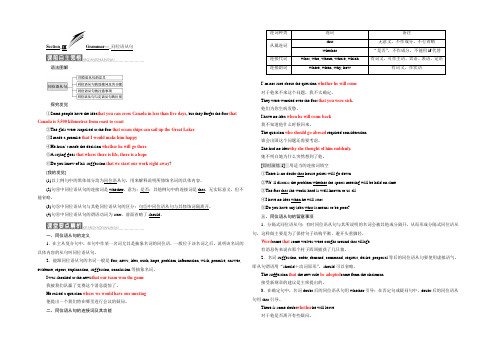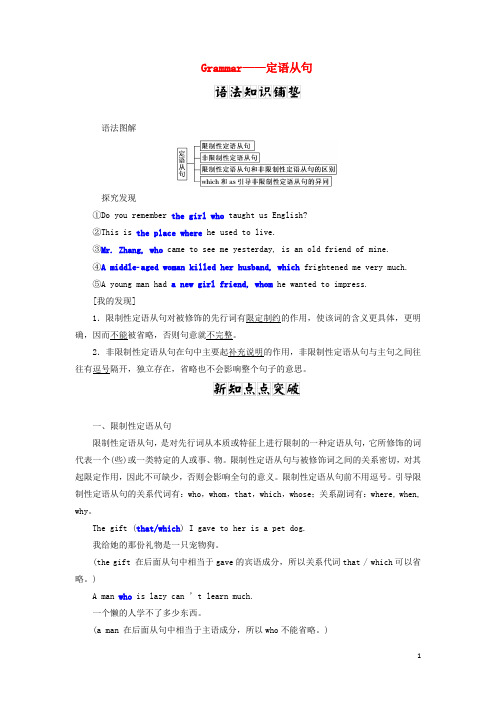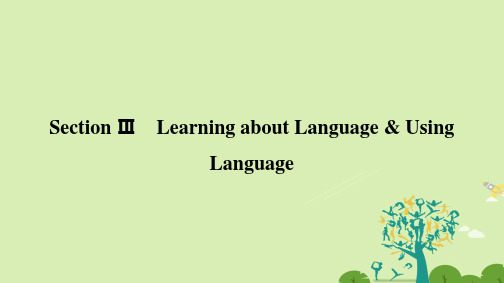高中英语必修五UNIT3学案
高中英语必修五Unit 3教学课件—【希沃白板培训结营大作业】

Name
Manufacturing robots
Appearance (Shown in the picture.)
Functions
Producing goods such as…
How it works?
Advantages Disadvantages
Engineer programme robots to perform tasks in space Robots produce goods the trained representatives live and work in space settlements to monitor transport the goods by industrial spaceship back to earth
Step4 · Further reading---科技说明文之introduction to new inventions(Fast-reading,get key information )
Inventions
Features
Appearance
Flying cars
Functions
How it works
1.no waste 2.no pollution 3. no environmental damage
People must live on a space station to monitor the robots
Step3 · Understanding the text— key information and reading between the lines
Work as inventorsActΒιβλιοθήκη vecooperative
人教新课标版高中英语必修五Unit3全套单元教学教案汇总

人教新课标版高中英语必修五Unit 3全套单元教学教案汇总一、教学材料
授课年级、教材(名称、版次和页码)、单元名称、主题
授课年级:高二上第一学期
教材名称:Module 5 Unit 1 Great Scientists
版次:人教版页码:page 1-8
单元标题:Great Scientists
二、单元教学内容分析
1. 描述性分析:教材的主题线索、单元结构、各部分的关系、内容、语言特征、活
动等;
本单元中心话题是“科学家如何以探索、钻研、无畏的科研精神验证未知的科学真理”。
通过本单元的学习,学生可以了解一些科学家发现真理的过程,丰富科
技文化意识。
单元的各项活动和设计都围绕着一些科学家的主题进行。
单元中有warming-up, pre-reading, reading, comprehending, learning about language, using language, summing up, learning tip, reading for fun几个部分组成。
每一个板块任务明确,一目了然。
“热身”(Warming Up)部分要求学生完成问卷回答。
通过回答问卷,学生可以得到更多关于科学家的背景知识。
“读前”(Pre-reading)部分要求学生以小组形式回答若干个问题,其中让学生预
测了解进行科学研究的步骤,并引导学生在阅读理解后检验自己的预测是否正确。
2021-2022学年人教版高中英语必修三教学案:Unit 5 Section 3 Word版含答案

Section_ⅢGrammar—_同位语从句语法图解探究发觉①Some people have the idea that you can cross Canada in less than five days, but they forget the fact that Canada is 5,500 kilometres from coast to coast.②The girls were surprised at the fact that ocean ships can sail up the Great Lakes.③I made a promise that I would make him happy.④He hasn't made the decision whether he will go there.⑤A saying goes that where there is life, there is a hope.⑥Do you know of his suggestion that we start our work right away?[我的发觉](1)以上例句中的黑体部分均为同位语从句,用来解释说明所修饰名词的具体内容。
(2)句④中同位语从句的连接词是whether,意为:是否;其他例句中的连接词是that,无实际意义,但不能省略。
(3)句⑤中同位语从句与其他同位语从句的区分:句⑤中同位语从句与其修饰词隔离开。
(4)句⑥中同位语从句的谓语动词为start,前面省略了should。
一、同位语从句的定义1.在主从复合句中,在句中作某一名词尤其是抽象名词的同位语,一般位于该名词之后,说明该名词的具体内容的从句叫同位语从句。
2.能跟同位语从句的名词一般是fact, news, idea, truth, hope, problem, information, wish, promise, answer, evidence, report, explanation, suggestion, conclusion等抽象名词。
_新教材高中英语Unit3CONSERVTIONSectionⅢGrammar__定语从句学案

Grammar——定语从句语法图解探究发现①Do you remember the girl who taught us English?②This is the place where he used to live.③Mr. Zhang, who came to see me yesterday, is an old friend of mine.④A middleaged woman killed her husband, which frightened me very much.⑤A young man had a new girl friend, whom he wanted to impress.[我的发现]1.限制性定语从句对被修饰的先行词有限定制约的作用,使该词的含义更具体,更明确,因而不能被省略,否则句意就不完整。
2.非限制性定语从句在句中主要起补充说明的作用,非限制性定语从句与主句之间往往有逗号隔开,独立存在,省略也不会影响整个句子的意思。
一、限制性定语从句限制性定语从句,是对先行词从本质或特征上进行限制的一种定语从句,它所修饰的词代表一个(些)或一类特定的人或事、物。
限制性定语从句与被修饰词之间的关系密切,对其起限定作用,因此不可缺少,否则会影响全句的意义。
限制性定语从句前不用逗号。
引导限制性定语从句的关系代词有:who,whom,that,which,whose;关系副词有:where, when, why。
The gift (that/which) I gave to her is a pet dog.我给她的那份礼物是一只宠物狗。
(the gift 在后面从句中相当于gave的宾语成分,所以关系代词that / which可以省略。
)A man who is lazy can ’t learn much.一个懒的人学不了多少东西。
(a man 在后面从句中相当于主语成分,所以who不能省略。
人教版高中英语必修五Unit3分课时课件设计说明

Most likely …
• I’m sure…
Probably…
• Suppose that …
Perhaps … Maybe …
GБайду номын сангаасammar in this unit:
1.过去分词作状语(The past participle as the adverbial) • Worried about the journey, I was unsettled for the first few
Writing in this unit
•Imaginative writing: life in the future. •Report.
课件课时设计
Warming up and Reading(1)
Reading(2) and Language points
Discovering useful structures
days. • Confused by the new surroundings, I was hit by the lack of
fresh air. 2.过去分词作定语(The past participle as the attribute) • I followed him to collect a hovering carriage driven by
高中英语课件
madeofcanruohanxing
教材分析与重组
1.课文内容 2. 重点难点 3. 课时安排
教学内容分析: 本单元以life in the future 为中心话题,旨在通过本单元的学 习, 让学生大胆发挥想象, 对人类今后的生活环境,生活方式进 行猜测, 提倡环保生活意识, 同时让学生学会过去分词作定语和 作状语的不同用法, 最后让学生将本单元所讨论的话题和推测手 法结合, 学习怎么样写report 本单元所涉及的要点有: (1) 学习并了解未来生活的各个方面用与现在生活的不同之处,
金版新学案高中英语Unit3TheMillionPoundBankNotSectionⅢLearni

manner n.方法,方式;态度(pl.)礼貌,规矩;举止 (1)in a...manner 以……的方式 (2)manners 礼貌,礼仪;习俗 It’s good/bad manners to do sth. 做某事是有/无礼貌的 It’s bad manners to stare at others. 盯着别人看是没有礼貌的。
in rags 衣衫褴褛(in 是介词,表示穿的状态)
But he’s in rags!但是他穿得破破烂烂的!
be in rags
穿着破旧的衣服(表状态)
be in a red shirt 穿着红色的衬衫(表状态)
be dressed in... 穿着……(表状态
The police made a sign for me not to approach the man in rags. 警察向我示意,不要去接近那个衣衫褴褛的人。
2.句型展示:You must come whenever you want and have whatever you like. 您什么时候想来就来,想吃什么就吃。 名师指津:whatever 引导宾语从句。 句式仿写:It’s wrong to give children__________________. 孩子要什么给什么是错误的。
(1)by chance take one’s chance
偶然 碰运气;冒险
(2)
The chance is that... Chances/The chances
are
that...可能……
There is a chance that...
You should never take chances when driving a car. 开车时,千万别冒险。
人教 高中必修五Unit3 reading及language point 导学案(无答案)-word文档
Unit 3 Life in the future一、学习目标1. To illustrate Ss’ imagination of future life.2 To arouse Ss to pay more attention to the problems that probably appear in the future life.3. To make Ss know the difference of life between the past, present and future.4. To grasp the key sentence patterns, some useful words and expressions in this passage.二、重点难点重点:To learn different reading skills such as guessing, key sentences, skimming and so on.难点:To learn different reading skills for different reading purposes, to understand the long and difficult sentences and to grasp the key sentence patterns, some useful words and expressions in this passage三、使用说明及学法指导1.学生课前用10分钟左右预习课文,完成自学提纲的阅读理解题。
2.学生在课堂上大约用25分完成课堂自主及合作学习,然后讨论、订正和展示、讲评。
四、课前自学提纲(大约用10分钟个人预习完成,课堂上小组讨论订正)课前预习练习:阅读课文,从每题所给的四个选项中选出最佳答案,并将答案写在题号前。
1.What kind of prize did Li Qiang win last year?A. The prize was to make a trip into the year AD 3008.B. The prize was a hovering carriage.C. The prize was to visit a space station.D. The text doesn’t mention it.2. If you suffered from “time lag”, what woul d happen?A. You would forget what time it was.B. You would forget where you were.C. You would remember the “jet lag” you get from flying.D. You would keep getting flashbacks from your previous time period.3. Li Qiang’s head ached because ________.A. he was hit by a lack of fresh airB. he caught a bad coldC. he suffered from “time lag”D. he was very exhausted4.It is obvious that Li Qiang wrote this e-mail to his parents________.A. before traveling into the year AD 3008B. during the journey to the year AD 3008C. when he won the prize last yearD. after flying into the year AD 30085.What did Li Qiang notice first when he arrived in AD 3008?.A. Hovering carriages flying all around.B. A strong-looking house.C. The thin air he couldn’t tolerate.D. A large room with soft lighting.五、课堂自主及合作学习(大约用25分钟小组自主或合作学习后,进行展示)Task 1:Warming upWith a partner, discuss and finish the table on Page 17 in the textbook.Task 2:Pre-reading(Discuss the following questions with you group members and share your ideas in class.)1.Can you tell what problems people are facing today?2. Which problems do you think will have overcome in one thousand years? Which ones do you think will still exist in AD 3008? Give your reasons.Task 3:Fast-reading (Read the reading section and answer the question.)( ) 1. This passage mainly tells us ________.A. an adventurous journeyB. What life is like in AD 3008C. what is “Future Tours”D. Li Qiang’s opinion on the futureTask 4:Careful-readingI. Read the text and then do True (T) or False (F).(1) Li Qiang was sent to experience the life of AD 3008. ( )(2) The life of the future was comfortable and the flight journey to the future was dangerous. ( )(3) It was difficult for Li Qiang to learn to use the hovering carriage. ( )(4) Li Qiang had been transported into the future of his hometown. ( )(5) In the future, everything is prepared by magic. ( )Task 5:Post-readingComplete the following passage according to the text.I have to remind myself _____________ that I am _____________ up this prize and I’m really in the year of AD 3008. I suffered from “time lag” that I kept getting flashbacks from _____________ time period. We climbed in the capsule through a small _____________. It was very comfortable. A few minutes later, the journey was completed and we had arrived. At first the _____________were hard to _____________. Because of the _____________ of the fresh air, I’d got a headache. So I put on a mask. Then I follow ed Wang Ping to collect a hovering carriage driven by computer. These carriages float above the ground and by _____________ down in the seat, we can move swiftly. Wang Ping showed me how to use it, but I lost _____________ of him when we reached a place where many carriages flew by in all directions. Later we arrived at a strange-looking house which had a green wall made of trees. A table and some chairs could rise from under the floor by flashing a ___________ on a computer screen. I was exhausted that night and fell asleep quickly.六、知识梳理(大约用30分钟完成长难句理解、重点句型和词汇学习后,进行展示)(一)语言点梳理1. take up拿起;开始从事;接受(建议或能得到的东西);占(时间、空间、注意力等);继续2. remind sb. to do sth.提醒某人做某事;remind sb. about/of sth. 使某人想起或意识到……;提醒某人某事remind sb.+(that)/wh-从句提醒某人……;使某人想起……;3. be similar to与……相似;be the same as与……相同;be different from与……不同4. suffer from 遭受……5. be back on one's feet(困境后)恢复;完全恢复6. sweep up打扫,横扫;涌向;快速地抱起7. lose sight of 看不见, 忘记, 失去其反义词组:catch sight of sth /sb 看见某人/物8. fell fast asleep 酣睡。
金版新学案高中英语Unit3TheMillionPoundBankNotSectionⅣGramma
(5)because 可引导表语从句,常用于结构:This/That is because...意为:这/ 那是因为……
That’s because I was too busy then. 那是因为那时我太忙了。 (6)主语为 advice,suggestion,proposal,demand,desire,requirement,request, order,command 等表示建议、要求、命令等意义的名词时,表语从句的谓语要 用“(should+) do”,其中 should 可省略,表示虚拟。 His request is that they (should) stay here for the night. 他请求他们应该在这 儿逗留一晚。
(2)宾语从句中的否定前移。 满足下面两个条件时,从句中的否定词 not 可以前移至主句中。 ①主句为第一人称。 ②主句谓语为 think,believe,imagine,suppose 或 expect 等动词。 I didn’t think that he understood your question.(形式上否定主句谓语 think, 实际是否定宾语从句中的谓语 understood) 我想他没有弄懂你的问题。
2.that 引导宾语从句时,在下列情况下不可省略: (1)当 that 从句与主句谓语动词被其他成分分开时。 I realized at once that I had done wrong immediately she told me all about this. 她一告诉我所有这一切,我就立即意识到我错了。
名师点津:在宾语从句中,引导词 whether 和 if 基本一样,但下面两种情况 只能使用 whether:
①引导介词后的宾语从句时; ②和 or not 一起连用时。 In recent years,there has been a heated argument about whether it is necessary for children to learn English from an early age.近几年来,关于儿童是否 应该从早年学英语有激烈的争论。
金版新学案高中英语Unit3ComputersSectionⅢLearningaboutLangua
2.句型展示:I would really like to play against a human team,for I have been programmed to act just like them.
我真的想和真人球队比赛,因为我被设计成像他们一样地活动。 名师指津:for 因为,引导原因状语从句。 句式仿写:It must have rained last night,for_the_ground_is_wet. 昨晚一定下雨了,因为地面湿了。
Section Ⅲ Learning about Language & Using Language
课前·自主预习
Ⅰ.重点单词
根据音标、词性和汉语写出单词
1./′daʊnləʊd/____________(vt.)下载
2./′sΙɡn
vi.&vt.)发信号;(n.)信号
3./tiːmmeΙt/____________(n.)同伴;伙伴
在某种程度上 处理,安排,对付 看守,监视 在……的帮助下 组成,弥补,编造 为了好玩 赠送,分发 好好利用
Ⅲ.重点句型 1.句型展示:She programs us with all the possible moves she has seen while watching human games. 她把观看人类比赛时所看到的一切可能动作编入我们的程序。 名师指津:while watching...为状语从句的省略 句式仿写:While_crossing_the_street,he was nearly knocked down by a car. 他过马路时,差点被一辆车撞了。
arise vi.(arose,arisen)出现,发生 (教材原句 P23)Then she prepares reliable moves to use if a new situation
2014届高中英语单元复习学案精品人教版新课标必修五Unit 5 First aid--period3
Unit 5 First AidPart 1 Teaching Design第一部分教学设计Period 3 A sample lesson plan for Using Language(HEROIC TEENAGER RECEIVES AWARD) IntroductionLanguage is learned to be used in and for communication. So in this period we shall have the students1, after warming up by reading aloud the text, read and discuss, read and underline, do exercises, listen, write first aid instructions for various situations and write a letter. The class ends by students filling a form.Objectives■To help students read the passage HEROIC TEENAGER RECEIVES AW ARD on page 38■To help students use the language by listening, speaking and writing as wellProcedures1. Warming up reading aloud the textRead aloud to warm up: Let’s warm up by reading aloud to the recording of the text HEROIC TEENAGER RECEIVES AWARD.2. Reading and discussingThis reading passage is in the form of a newspaper article and is an example of how knowledge of first aid can save lives. Before you read the newspaper article, let’s discuss the scenario in groups: You can hear a woman screaming. You find her sitting on the ground, bleeding heavily from deep knife wounds in her hands. Do you help her? If so, what do you do?Often readers only want to get a quick idea of a newspaper article and do not want to know all the details. For this reason you might read just the headline and the first paragraph. It gives information that answers the questions Who? When?Where?What? And often also Why?and How?3.Reading and underliningNext you are to read and underline all the useful expressions or collocations in the passage. Copy them into your notebook and write a short passage, making use of them after class as homework.4.Doing exercisesNow you are going to do Exercises 1, 2, 3 and 4 on page 39 following the article.5. ListeningThrough the listening text, a quiz given by a first aid teacher, you can learn a few first aid procedures. Listen to the tape twice and finish the exercises No. 1 and 2.6. Writing first aid instructions for each situationYou can choose any one of the four situations to write down the instruction.7. Writing a letterTurn to page 75 and follow the direction to write a letter to your principal. You may use the information, structures and expressions from the unit.8 Closing down by filling a form。
- 1、下载文档前请自行甄别文档内容的完整性,平台不提供额外的编辑、内容补充、找答案等附加服务。
- 2、"仅部分预览"的文档,不可在线预览部分如存在完整性等问题,可反馈申请退款(可完整预览的文档不适用该条件!)。
- 3、如文档侵犯您的权益,请联系客服反馈,我们会尽快为您处理(人工客服工作时间:9:00-18:30)。
朝阳市第三高级中学高二英语 Book5 Unit3 Life in the Future 导学案编写:
张琦审核:张春兰编号:姓名:班级:
高中英语必修5 Unit 3 Life in the Future
一、单词英汉互译
1. _____________ vt.& n.缺乏,没有缺乏 2. _____________vt.系牢,扎牢
3. _____________ vt.& n.按,逼迫,印刷 4. _____________ vt.吞下,咽下
5. _____________ vt.回收利用,再利用 6. _____________n.方面,层面 7. _____________
n.面具,伪装 8. _____________n.垃圾箱
9. _____________n.公民,居民,市民 10. ____________ v.(使)闪光
11.material n. _________________ 12.guide n. _________________ 13.switch n.
_________________
14.instant n. ________________ 15.greedy adj.
________________ 16.previous adj. ________________ 17.manufacture vt.
________________ 18.optimistic adj. ________________ 19.exhausted adj.
________________ 20.tolerate vt. ________________ 二.词汇拓展
1.impress v.压出印记;使深深印在 ____________n.印象;(书籍)一次印刷
___________adj.给人留下深刻印象的
⑴ The first___________(impress) of this book was sold very quickly so two more
____________(impress) were ordered.
⑵ They produced a strong _____________ (impress) on me. ⑶ The way he talks is really
_____________ (impress). 2.adjust v.调整,使适应 ____________n.调整,调节
____________adj.可调动的,可调节的 ___________[搭配]适应??
⑴ The desks and seats can ________ (adjust) to the height of any child. ⑵ My eyes
haven’t adjusted___the dark yet.
⑶ An __________ (adjust) electric lamp can be placed in various positions. ⑷ Try
to make some __________(adjust) of your differences so that you can work together
without quarrels. 3.instant n.瞬间;片刻adj.立即的;立刻的 ____________adv. 立即
地 conj.一??就 ______________[搭配]一??就
⑴ Please tell me________ (instant) he arrives. ⑵_____ instant he opened the door
he saw the thief. 4.press v.挤,压,逼迫;n.新闻,印刷 ___________adj.紧急的,紧迫
的 ___________n.压力,压强
⑴ The minister invited the ______ (press) to a meeting to explain his actions. ⑵
Villagers are unaccustomed to the______ (press) of modern life. ⑶ What they
discussed was a most _______ (press) problem. 5.optimistic adj. 乐观(主义)的
_____________n.乐观主义者_____________n.乐观,乐观主义
⑴ Those __________ (optimism) are optimistic________ their future. ⑵ At the
airport,he expressed _________(optimistic) about the talks. 6.settle v.解决;安
居
_________n.定居者,移居者__________n.定居,居住地;解决;协议⑴ Now a number of
farmers live in new ___________ (settle).
⑵ Five years having passed,the government and the villagers haven’t reached any
____________ (settle) yet.
⑶ With the problem ________ (settle),we became good friends.
⑷ It is said that the first _________ (settle) of this country are prisoners.
7.previous adj.在前的;早先的;从前的 previous to 在??之前(to是介词) 运用:根据
汉语意思完成英语句子。⑴有时候,我还翻看我以前写的文章。 I sometimes look through
________________. ⑵在你上课之前,我们讨论到了这个问题。 ______________________,we
discussed the matter. 8.guide n. 指导;向导;导游;vt.指引;指导 guide
sb.along/through/to 带领某人?? be guided by sb.由某人引导/指导拓展:guidance n.
指导;咨询
with one’s guidance 在??的指导下运用:根据汉语意思完成英语句子。
⑴在他的指导下,该村进行了一次大胆实验。
____________________, the village took a risky experiment. ⑵一个当地农民带我们穿
过这片森林。 A local farmer ________________________.
